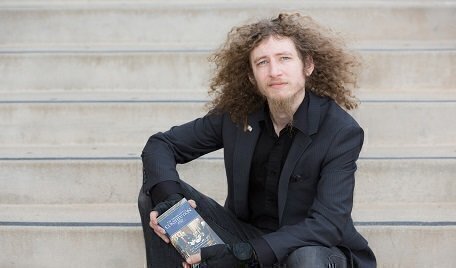When and where can students and members of the public express their free-speech rights at public universities? These First Amendment rights are limited and differ greatly based on policies set by colleges and state lawmakers.
 News reports about free speech restrictions at schools and a desire of some public universities to keep their “free-speech zones” have led to a lot of debate, and a few lawsuits, in recent years. In March 2017, Kevin Shaw (left), a student at Pierce College in California, sued the public community college when he was prevented from handing out Spanish-language copies of the Constitution by an administrator. Shaw was not in a college-designated free-speech zone at the time and didn’t have a school-endorsed permit to solicit literature.
News reports about free speech restrictions at schools and a desire of some public universities to keep their “free-speech zones” have led to a lot of debate, and a few lawsuits, in recent years. In March 2017, Kevin Shaw (left), a student at Pierce College in California, sued the public community college when he was prevented from handing out Spanish-language copies of the Constitution by an administrator. Shaw was not in a college-designated free-speech zone at the time and didn’t have a school-endorsed permit to solicit literature.
Pierce College’s policies stated that it considered the campus a “non-public forum” except for areas designated as “free speech areas” with a normal flow of student traffic, Shaw's attorneys said in a lawsuit filed in federal court.
The Foundation for Individual Rights in Education (or FIRE), a Philadelphia-based First Amendment advocacy group, is representing Shaw along with a law firm. FIRE said the free-speech area represented 616 square feet on a 426 acre campus, and claimed the Pierce College free-speech policy was clearly unconstitutional.
FIRE has won in court in similar cases. In 2014, it represented a student at Citrus College in California who won a $110,000 settlement after school officials wouldn’t let him solicit a petition protesting government surveillance because he was outside of a free-speech zone. Back in March, when USA Today covered Shaw's suit, FIRE told the newspaper that 10 percent of the 450 colleges and universities it tracks have free-speech zones
While Shaw’s case involves a student claiming a free-speech violation, not only students have free-speech rights on public university property. Outside groups with strong, controversial messages such as the Westboro Baptist Church, have appeared on college campuses. (Guests who also speak about provocative topics, if invited on campus by a school or through a facility rental program, have similar rights.)
The subject of free-speech zones on campus remains a sore point. The zones started during the Vietnam War era, when universities needed a way to safely contain anti-war protests. Some states and public universities are either eliminating free-speech zones or scaling back their use. North Carolina, Tennessee and Arizona recently passed laws that protect the rights of speakers of all viewpoints and restrict the use of free-speech zones. But some of these laws include sanctions against people who interrupt the First Amendment rights of speakers on campus.
Thomas Harnisch, director of state relations and policy analysis at the American Association of State Colleges and Universities, told USA Today in July that there are concerns about the laws being politically motivated and infringing on the traditional rights of schools to ensure a safe environment. "These bills are not uniform, and they range from being relatively benign to redundant while others are very prescriptive and micromanage campuses. Some of these bills could be dangerous in the sense that they could tie the hands of campuses in their efforts to protect the physical safety of those on campus,” he said.
And the issue came up in Congress in June at a Senate Judiciary Committee hearing on the First Amendment at college campuses.
Eugene Volokh, a UCLA law professor, told the committee that the interchange between First Amendment speakers on campus was important. “The First Amendment doesn’t require public universities to protect speakers from being shouted down or even attacked. It does bar public universities from protecting some speakers based on viewpoint but denying such protection to others; but when a university wants to let hecklers and thugs generally control what is said on campus, that is not itself a First Amendment violation. Yet it is an abdication of the universities’ responsibility to foster free discussion,” Volokh said.
And Floyd Abrams, the noted First Amendment attorney, told the Senate panel that while such debates can be painful that were useful and had remedies.
“The answer to the suppression of almost any speech, the First Amendment answer, cannot be to limit expression but to discuss it, not to bar offensive speech but to answer it. Or to ignore it. Or to persuade the public to reject it. I know that’s easy to say but it’s got to be the way we respond to speech which we abhor. What is unacceptable is to suppress the speech.”
Scott Bomboy is the editor in chief of the National Constitution Center.







